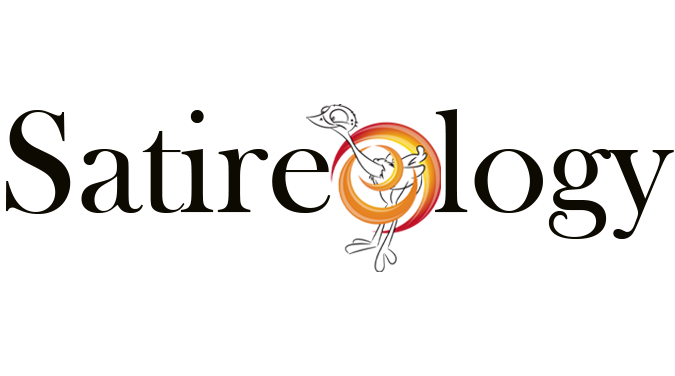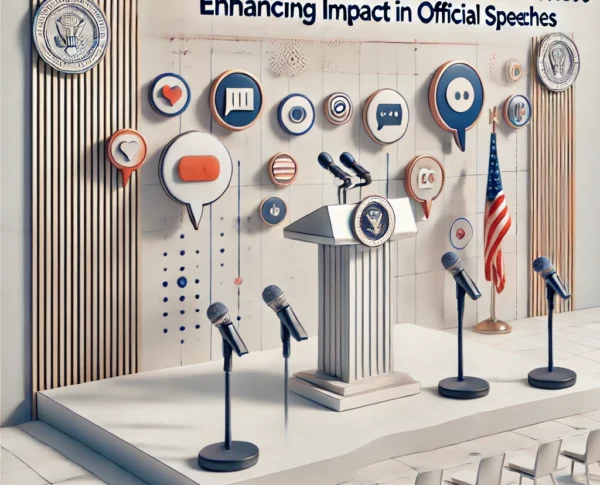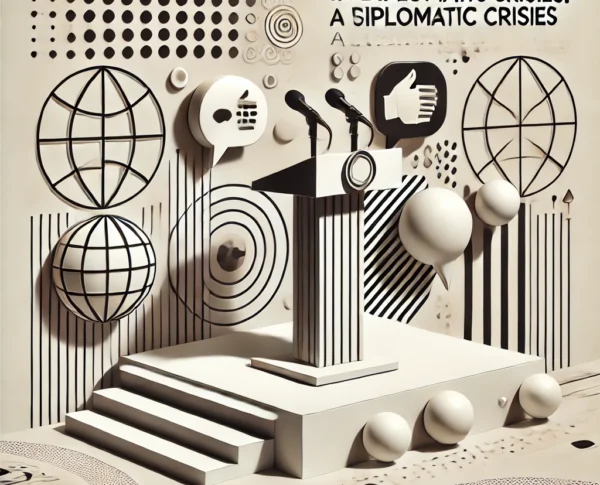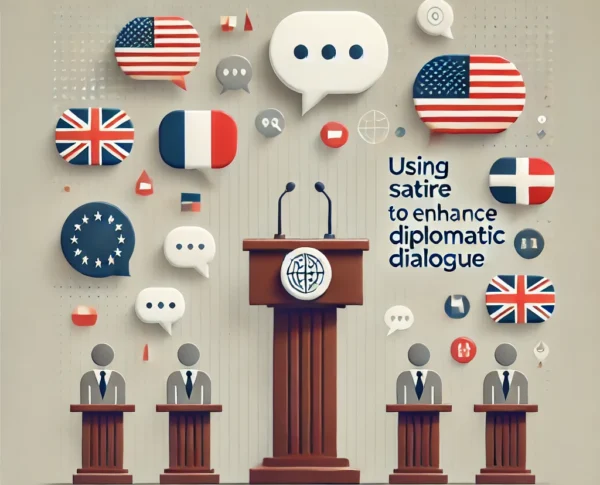Course Introduction:
Satire is a powerful tool in diplomatic discourse, often used to convey messages effectively and in unconventional ways. It plays a significant role in influencing public opinion and international political conversations, offering a means of expressing challenging positions without direct confrontation. In this training course, “The Art of Satire in Diplomatic Discourse: Tools of Soft Power,” the focus will be on how to employ satire as an effective communication tool in diplomacy, including speeches, negotiations, and crisis management.
Participants will learn various techniques on how to strategically utilize satire, enhancing their influence in different situations while considering the ethical and diplomatic risks associated with this tool.
Course Objectives:
Understanding Satire in Diplomacy: Provide participants with a fundamental understanding of how satire is defined and utilized in diplomatic discourse.
Developing Satire as a Tool of Influence: Teach participants how to effectively use satire in diplomatic speeches to enhance soft power.
Using Satire in Negotiations and Crisis Management: Train participants on how to employ satire in negotiations and crisis situations to achieve diplomatic goals.
Recognizing Ethical Risks of Satire: Educate participants on how to handle the challenges and risks that may arise from the use of satire in diplomacy.
Applying Satire in Real Diplomatic Scenarios: Provide practical workshops to help participants refine their skills in employing satire in real-world diplomatic contexts.
Course Outcomes:
By the end of the course, participants will be able to:
Gain a deeper understanding of satire in diplomacy: Identify and effectively use satire in diplomatic speeches and discourse.
Develop skills in crafting satirical diplomatic speeches: Write diplomatic speeches and texts that include well-thought-out satirical elements.
Use satire in negotiations: Smartly employ satire in negotiations to achieve positive outcomes.
Analyze satirical speeches: Evaluate and critique the use of satire in famous diplomatic speeches.
Manage crises with satire: Apply satire strategically in crisis situations without negatively impacting diplomatic relations.
This course equips participants with the knowledge and skills necessary to use satire effectively and responsibly in the context of diplomacy, enhancing their ability to influence and manage complex situations with tact and intelligence.
5-Day Training Course Outline:
Day 1: Introduction to Diplomatic Satire and Its Impact
Session 1: Defining Satire in a Diplomatic Context
What is satire?
When and how has it appeared in diplomatic discourse?
Examples from diplomatic history.
Session 2: Distinguishing Satire from Humor in Diplomacy
Satire as a tool for communication and influence.
How to differentiate informal humor from calculated satire.
Session 3: Case Study: Use of Satire in Leaders’ Speeches
Analysis of prominent satirical diplomatic speeches.
Day 2: Tools and Techniques of Satire in Diplomatic Discourse
Session 1: Building the Satirical Argument
How to develop a diplomatic argument using satire.
Key elements of successful diplomatic satire.
Session 2: Satire as a Tool of Soft Power
How satire can enhance soft power.
Examples of satire’s success in fostering international relations.
Session 3: Case Study: Analyzing a Satirical Diplomatic Speech
Breaking down and analyzing the elements of a famous satirical speech.
Day 3: Satire as a Tool for Negotiation and Crisis Management
Session 1: Satire in Diplomatic Negotiation
When and how satire can be used in negotiations.
Benefits and risks of satire during negotiations.
Session 2: Satire in Crisis Management
How satire can redirect the conversation in a crisis.
The impact of satire on easing tensions.
Session 3: Workshop: Simulating Diplomatic Negotiations
Applying satire in complex diplomatic negotiations.
Day 4: Challenges and Risks of Using Satire in Diplomacy
Session 1: Ethical Boundaries of Satire in Diplomacy
When satire becomes harmful or inappropriate.
Balancing influence with respect.
Session 2: Risks of Overusing Satire
How satire can damage diplomatic relations.
Examples of failed satire in official speeches.
Session 3: Case Study: Analyzing the Failure of a Satirical Speech
Discussing how satire led to negative outcomes in specific diplomatic situations.
Day 5: Practical Applications and Skill Development
Session 1: Writing a Satirical Diplomatic Speech
Step-by-step guidance on crafting a diplomatic speech that incorporates satire.
Session 2: Presenting Speeches and Constructive Feedback
Participants present their speeches and receive critiques and feedback.
Session 3: Strategies for Using Satire in Future Scenarios
How to continue improving satirical skills in diplomatic speeches.
Course review and future tips.
Curriculum
- 6 Sections
- 39 Lessons
- 10 Weeks
- Day 1: Introduction to Diplomatic Satire and Its Impact0
- Session 1: Defining Satire in a Diplomatic Context8
- 2.0What is satire?
- 2.1When and how has it appeared in diplomatic discourse?
- 2.2Examples from diplomatic history.
- 2.3Session 2: Distinguishing Satire from Humor in Diplomacy
- 2.4Satire as a tool for communication and influence.
- 2.5How to differentiate informal humor from calculated satire.
- 2.6Session 3: Case Study: Use of Satire in Leaders’ Speeches
- 2.7Analysis of prominent satirical diplomatic speeches.
- Day 2: Tools and Techniques of Satire in Diplomatic Discourse8
- 3.0Session 1: Building the Satirical Argument
- 3.1How to develop a diplomatic argument using satire.
- 3.2Key elements of successful diplomatic satire.
- 3.3Session 2: Satire as a Tool of Soft Power
- 3.4How satire can enhance soft power.
- 3.5Examples of satire’s success in fostering international relations.
- 3.6Session 3: Case Study: Analyzing a Satirical Diplomatic Speech
- 3.7Breaking down and analyzing the elements of a famous satirical speech.
- Day 3: Satire as a Tool for Negotiation and Crisis Management8
- 4.0Session 1: Satire in Diplomatic Negotiation
- 4.1When and how satire can be used in negotiations.
- 4.2Benefits and risks of satire during negotiations.
- 4.3Session 2: Satire in Crisis Management
- 4.4How satire can redirect the conversation in a crisis.
- 4.5The impact of satire on easing tensions.
- 4.6Session 3: Workshop: Simulating Diplomatic Negotiations
- 4.7Applying satire in complex diplomatic negotiations.
- Day 4: Challenges and Risks of Using Satire in Diplomacy8
- 5.0Session 1: Ethical Boundaries of Satire in Diplomacy
- 5.1When satire becomes harmful or inappropriate.
- 5.2Balancing influence with respect.
- 5.3Session 2: Risks of Overusing Satire
- 5.4How satire can damage diplomatic relations.
- 5.5Examples of failed satire in official speeches.
- 5.6Session 3: Case Study: Analyzing the Failure of a Satirical Speech
- 5.7Discussing how satire led to negative outcomes in specific diplomatic situations.
- Day 5: Practical Applications and Skill Development7
- 6.0Session 1: Writing a Satirical Diplomatic Speech
- 6.1Step-by-step guidance on crafting a diplomatic speech that incorporates satire.
- 6.2Session 2: Presenting Speeches and Constructive Feedback
- 6.3Participants present their speeches and receive critiques and feedback.
- 6.4Session 3: Strategies for Using Satire in Future Scenarios
- 6.5How to continue improving satirical skills in diplomatic speeches.
- 6.6Course review and future tips.






